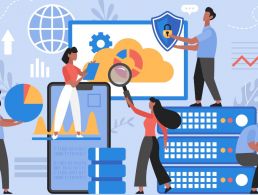Data science is more than just a summation of hard skills. You need certain soft skills if you want to progress, writes data scientist Vin Vashishta.
What are soft skills? ‘Soft skills’ is one of those terms that is often used but rarely understood. Soft skills are skills with subjective measures of competence. Are they really necessary? Yes. If you want your career to move beyond the intermediate stage, soft skills are a must.
Data science is more than just a summation of skills. There are externalities that impact both the inputs and outputs of data science. Without soft skills, you can produce data science, but it has limited value to the business.
Many career advice pieces talk about soft skills without any explanation beyond a term and how you use it. What are communication skills? What is business acumen? And what other soft skills do you need?
Communication
There are three main components of communication skills. The first is message creation. How well can you summarise the information you need to communicate into a few high-level points? What are your primary communication objectives for any given interaction?
Most people talk but don’t communicate because they don’t start the conversation, email or presentation with any communication objectives. Without objectives, you don’t really have a chance of being successful.
For a data scientist, message creation is especially important. There is so much we can say about a project or approach. The question is, what do we need to communicate about the project to this person or audience?
Who am I talking to and what do they need to know? That’s how message creation starts. Refine your message for each project and each stakeholder.
The second component is message discipline. Once you’ve chosen a message, how well do you stick to your communication objectives? It’s easy to get off track or derailed by a question. Message discipline is the ability to avoid those rabbit holes and stay on point.
Finally, there is message retention. The point of communication is to deliver your message. Your target audience retaining that message is a critical success factor. At the end of your communication, how well does the audience repeat back what you’ve said? Did they receive your message, or did they get something else?
Business acumen
Business acumen is an understanding of the governing dynamics of business. It’s a term that is rarely explained because it’s much more complex than this simple definition implies.
Why businesses operate as they do is a subject many people spend an entire career trying to understand. A data scientist can’t be expected to also be an expert in all facets of business.
What a data scientist needs to know is:
- what the business produces
- how it produces
- who consumes its products
- how the business makes decisions
Each of those knowledge points is connected to our work products. How does data science support products and services? That question determines a lot about what should be built.
Who are the business’s customers and users? Understanding who uses the products we support helps us build solutions that meet the customers’ needs. There are usually several possible solutions to a data science problem. A big part of choosing the right solution is understanding how the solution fits the customers’ needs.
There are a lot of soft aspects here, such as culture, mindset, team dynamics and leadership style. Understanding how decisions are made at multiple levels helps us provide the right data, in the right format, to the right audience at the right point in the decision life cycle.
Think differently
Data scientists aren’t expected to think like everyone else does. We’re often contrarians. We challenge assumptions. We introduce new ways of thinking and solving problems. We have a complex toolset that most of the business doesn’t understand. A significant part of our value to the business comes from how different we are.
Difference can lead to friction if not handled the right way. We’re often seen as stubborn, obstructionist, idealistic or someone who ‘always has to be right’. All of those put a damper on collaboration, which is critical for us to be successful.
The key is to think differently but act collaboratively. That means being clear about your objectives. You’re not prescribing a solution, but instead making a different recommendation. You’re not contradicting, you’re presenting an alternative view. You put forth ideas for discussion rather than issuing an edict.
You need to help the people you interact with to see your differences as constructive. The key is to keep common goals in focus. When everyone is working towards the same thing, being different is seen in a positive light.
Mindset
Mindset is a soft skill we don’t talk enough about. It’s our strategy for thinking about and seeing events around us. Our mindset determines how we view and react to what happens to us in the workplace. Two different mindsets are important for data scientists.
In a growth mindset, we look at our capabilities as constantly evolving and growing. The opposite, a fixed mindset, sees our abilities as static.
A growth mindset is important for two reasons. In data science, your education is never complete, and setbacks or failures are a constant challenge. In a growth mindset, failures are temporary and can be overcome. A data scientist often sees multiple approaches fail before finding one that works. The challenges we’re given aren’t easy and often require us to go outside of our experience. The only way we overcome this is by seeing failure as temporary; something we can move past if we work at it.
The second mindset is abundance. An abundance mindset sees enough to go around. That’s an important way of thinking in a business. Those who have a scarcity mindset see limited resources. For someone to have enough, someone else must give something up. This zero-sum game mentality creates a toxic culture in business. Abundance sees enough credit to go around. Users can have exactly what they want instead of picking what’s most important while sacrificing in other areas. Abundance is inherently collaborative because it sees outcomes where everyone gets what they need.
A complete answer to ‘What is a data scientist?’ can’t leave out soft skills. The hard skills such as programming, math and stats get most of the visibility because there’s so much potential business value there. The soft skills are what turn that potential into reality. A data scientist in a silo cannot be effective.
It’s important to remember that data scientists don’t come straight out of school with all these soft skills. It’s up to businesses to help them learn each one.
Vin Vashishta is an applied data scientist and AI strategy consultant who has worked with brands such as IBM, Intel and SAP. He runs his own consultancy, v2ds.com.




